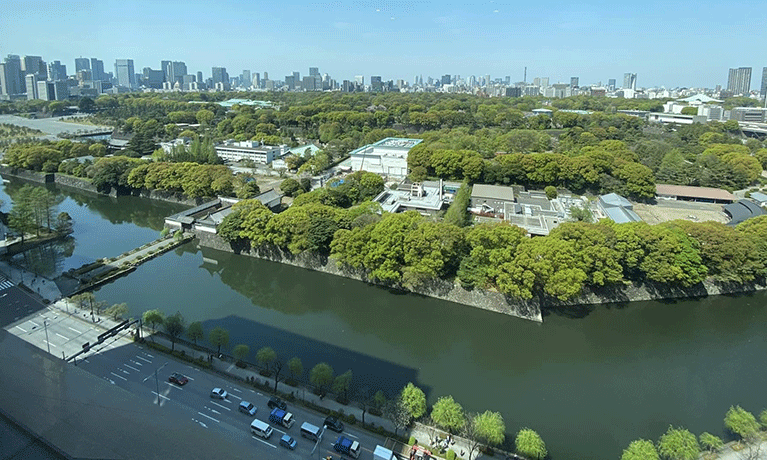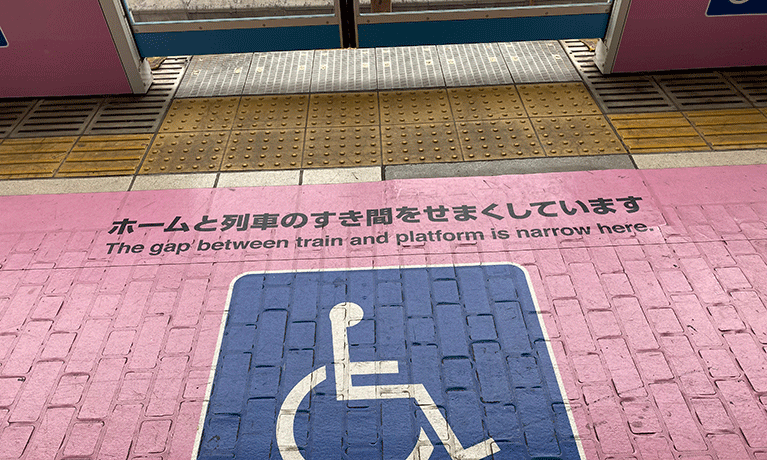By Dr Ian Brittain and Professor David Jarvis, Centre for Business in Society
In early April 2024 Dr Ian Brittain, a specialist in the study of the Paralympic Games and its legacies, and Professor David Jarvis, a specialist in transport policy, both from the Centre for Business in Society at Coventry University, travelled to Tokyo for six and a half weeks to study the impact of the Tokyo 2020ne Paralympic Games on accessible transport in Tokyo and beyond. The trip was funded by the European Union as part of the Horizon 2020 Research Innovation and Staff Exchange project called EventRights that aims to address inequality, enhance diversity and facilitate greater dialogue in the hosting of sporting mega events, and has partners in Austria, Brazil, Canada, Germany, Greece, Japan, Sweden, USA and the UK.
Exploring the Views of Disabled and Policy Makers
Basing themselves at Waseda University in the centre of Tokyo, they set out to interview disabled people, with a variety of impairments, regarding their experiences of public transport in Tokyo and beyond. They also interviewed people involved in the policy planning process for accessible transport and did a walking interview with one such individual, who is also a wheelchair user, that took in the use of Tokyo Metro and Japan Rail trains and one of the new Toyota ‘accessible’ taxis. They were also fortunate, as foreigners, to be able to purchase a three-week Japan Rail Pass that allowed them to travel to other parts of Japan using the Shinkansen and other Japan Rail trains and thus compare the accessibility of stations well beyond Tokyo.
They carried out interviews at organisations such as Disabled Person’s International – Japan, STEP Edogawa Centre for Independent Living, and Price Waterhouse Cooper. They also collected notes and photographic evidence from other cities and towns across Japan.
Turbo-Charging Policy
Their findings were quite positive, although it should be noted that the role of the Tokyo 2020ne Paralympic Games in this process was more to have turbo charged a policy process that has been ongoing since the late nineties, rather than being the sole reason for noted improvements.
There were still apparent issues with non-disabled attitudes towards disabled people and their awareness of why accessibility aids had been fitted to stations and trains, but on the whole, there was a perception of a marked improvement in transport accessibility, particularly in Tokyo, but also in larger towns and cities beyond. That does not, however, mean that there is not still further improvements necessary, particularly in more rural areas and in non-disabled attitudes and understanding.
Rural Areas Still Disadvantaged
In more rural areas train stations don’t tend to meet the criteria for upgrade of three thousand passengers a day and so disabled passengers in these areas still struggle to access the transport system.
Disability is a combination of physical and environmental barriers and whilst Japan may have done more than most to lessen physical and environment barriers there is still a lot of work to be done to raise awareness of the issues disabled people face within society and to overcome many of the negative attitudes towards disabled people by non-disabled society that are often rooted in fear and pity. However, it should be noted that this is a worldwide problem, not one that is solely found in Japan.

Tokyo Achieved More Than Previous Hosts of Paralympics
What was clear from the research carried out is that Japan has gone much further and done much more than previous or current Paralympic host cities. Japan used the Paralympic Games to turbocharge wider policies that have been ongoing since the nineties around accessibility for disabled people, by giving greater impetus to change via policies and budgets aligned to such events that might not otherwise be available. It should also be noted that their focus was a national one and not just restricted to the Tokyo Metropolitan area. In contrast, twelve years after the London Paralympic Games, only 92 of 270 (34%) are wheelchair accessible and in 2023 Network Rail admitted it was constructing seventeen inaccessible new footbridges at stations across the United Kingdom citing the age of the rail network and the costs involved in making them fully accessible.
Paris Should Learn From Tokyo
A similar argument is currently being used by the organisers of the Paris 2024 Paralympic Games as to why only one of the sixteen Paris Metro lines has been made accessible as part of the Paris 2024 legacy programme, and with no apparent plans to improve transport accessibility beyond Paris. There is clearly a stark difference between the Japanese approach of making societal accessibility and inclusion their leading target and those of the United Kingdom and France, both of whom made large claims for the legacies hosting the Paralympic Games would bring to their countries, but for whom financial outlay appears to outweigh the need for inclusion and a fairer society.
As part of their trip, Dr Brittain and Professor Jarvis also gave presentations to undergraduate students at Kansai University in Osaka and had meetings with the Policy Director of the Sasakawa Sports Foundation and the President and Senior Researcher from the Nippon Foundation Paralympic Research Group.
Through understanding the impact of organisations’ activities, behaviours and policies, the Centre for Business in Society at Coventry University seeks to promote responsibility, to change behaviours, and to achieve better outcomes for economies, societies and the individual.




Comments are disabled